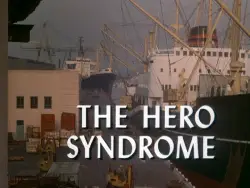The Hero Syndrome (Quincy, M.E.)
| The Hero Syndrome | ||||||||||||||||||||||||||||||||||||||
|---|---|---|---|---|---|---|---|---|---|---|---|---|---|---|---|---|---|---|---|---|---|---|---|---|---|---|---|---|---|---|---|---|---|---|---|---|---|---|

| ||||||||||||||||||||||||||||||||||||||
|
Episode Quote
"You can't be a hero with someone else’s blood on your hands."
― Dr. Quincy, The Hero Syndrome
Episode Overview
The Hero Syndrome first aired on NBC on November 18, 1977 (production code 48021) :contentReference[oaicite:1]{index=1}. Quincy investigates the murder of a notorious loan shark found on the docks. A shy longshoreman, Peter Thorwald, confesses to the killing, believing it makes him a hero among his peers. Quincy’s forensic acumen reveals the true weapon and uncovers the real culprit, turning the case into a courtroom drama.
Table of Contents
Application of The QME Episode Laws
✅ **Law 1 – Seek truth and justice:** Quincy’s autopsy reveals the fatal injury came from a baling hook rather than the crowbar confessed by Peter—exposing the false confession and protecting an innocent man :contentReference[oaicite:2]{index=2}.
✅ **Law 2 – Explore social/ethical issues:** The episode addresses workplace dynamics, peer pressure, and the allure of “hero” status within a blue-collar community—highlighting how personal and group identity can motivate self-incrimination.
✅ **Law 3 – Handle controversy sensitively:** The show navigates false confessions and moral psychology—delicately portraying Peter’s internal conflict and the community’s rush to lionize him, without sensationalizing his emotions :contentReference[oaicite:3]{index=3}.
✅ **Law 4 – Maintain scientific accuracy:** Quincy’s forensic interpretation of wound characteristics—discriminating the shape and weight of a baling hook versus a crowbar—is compelling, rooted in real forensic practice.
Collectively, this episode exemplifies how *Quincy, M.E.* uses precise science and social insight to defend truth and fairness.
Episode Synopsis
Peter Thorwald, a timid dockworker, confesses to murdering a feared loan shark with a crowbar. Quincy’s autopsy reveals the fatal blow came from a baling hook. Investigating motives and opportunity, Quincy exposes the actual killer. However, Peter resists clearing his name because being seen as a "hero" gives him newfound respect. Quincy then builds a forensic and moral case in court, persuading Peter to speak the truth and avoiding wrongful conviction.
Plot Summary
- Job scene on the docks escalates to a confrontation. - Victim found dead; Peter confesses believing he saved others. - Quincy’s examination identifies wound incompatible with confessed weapon. - Forensics track missing baling hook, implicating another worker. - Peter initially clings to his confession for status. - Quincy demonstrates the forensic facts in court. - Peter retracts confession; true killer prosecuted.
← *Main Man* • **The Hero Syndrome** • *Touch of Death* Season 3 Overview: Full Episode List :contentReference[oaicite:4]{index=4}
Main Cast
- **Jack Klugman** as Dr. R. Quincy
- **Robert Ito** as Sam Fujiyama
- **Garry Walberg** as Lt. Monahan
- **John S. Ragin** as Dr. Asten
Guest Cast
- **Robert Walker Jr.** as Peter Thorwald
- **Roy Jenson** as Loan Shark
- **Bill Quinn** as Dr. Weisbarth :contentReference[oaicite:5]{index=5}
Case File Summary
Victim: Dock loan shark Victim Status: Homicide, strangulated by baling hook False Confessor: Peter Thorwald, admitted guilt by crowbar Quincy’s Role: Autopsy and forensic analysis exonerated innocent and revealed true weapon
Additional Victims
None.
Alleged Perpetrators
- **Peter Thorwald** – False confession revoked
- **Unnamed dockworker** – True killer, identified via missing tool and forensics
Filming Locations and Exterior Footage
Shot on Southern California piers and studio mock-ups of dock environments—emphasizing gritty, blue-collar authenticity.
Forensic Science Insight
- Tool-based wound differentiation—classic forensic matching
- Autopsy context analysis in legal proceedings
- Psychological forensics—understanding false confession under social pressure
Themes & Tropes
- **False confessions & social identity** – exploring motivations for stepping up as a community “hero”
- **Science vs. bravado** – forensic facts overruling popular prestige
- **Justice through evidence** – court scenes highlight forensic process
Reception & Ratings
IMDb rating: **7.2/10** from 1,108 users :contentReference[oaicite:6]{index=6}. User reviews highlight the strong forensic storyline—even if the ending is viewed as extension of courtroom dramatics :contentReference[oaicite:7]{index=7}.
Critic & Fan Commentary
> “A decent episode but a dumb ending.” — planktonrules, IMDb :contentReference[oaicite:8]{index=8} > “Huge improvement… interesting and entertaining.” — rayoflite24, IMDb :contentReference[oaicite:9]{index=9}
Trivia
- Bill Quinn, portraying Dr. Weisbarth, previously played Klugman’s doctor in *The Odd Couple* :contentReference[oaicite:10]{index=10}.
Behind The Scenes/Backstage
This episode was originally titled "Macho" in early drafts prior to post production.
Cultural Impact
Shine light on the complexities of false confessions and community honor, reinforcing *Quincy, M.E.*’s legacy in forensic-social storytelling.
